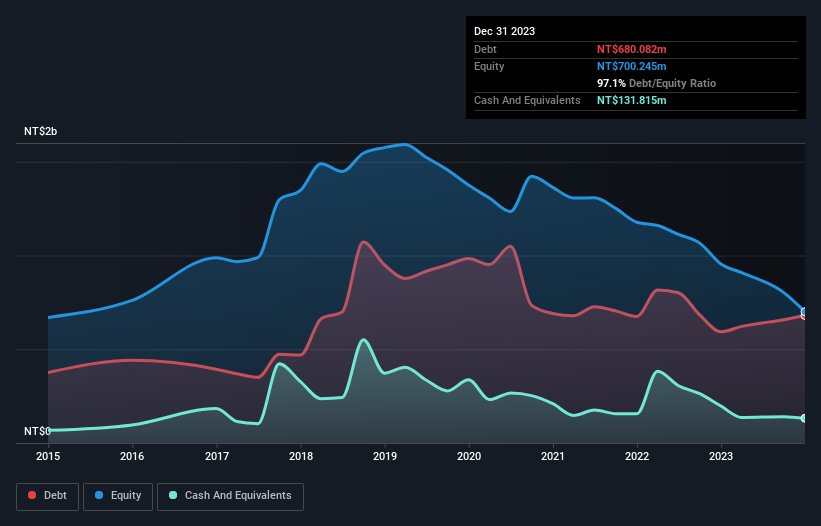
Legendary fund manager Li Lu (who Charlie Munger backed) once said, 'The biggest investment risk is not the volatility of prices, but whether you will suffer a permanent loss of capital.' So it might be obvious that you need to consider debt, when you think about how risky any given stock is, because too much debt can sink a company. Importantly, HY Electronic (Cayman) Limited (TWSE:6573) does carry debt. But the real question is whether this debt is making the company risky.
When Is Debt Dangerous?
Generally speaking, debt only becomes a real problem when a company can't easily pay it off, either by raising capital or with its own cash flow. If things get really bad, the lenders can take control of the business. However, a more common (but still painful) scenario is that it has to raise new equity capital at a low price, thus permanently diluting shareholders. Of course, the upside of debt is that it often represents cheap capital, especially when it replaces dilution in a company with the ability to reinvest at high rates of return. The first step when considering a company's debt levels is to consider its cash and debt together.
See our latest analysis for HY Electronic (Cayman)
What Is HY Electronic (Cayman)'s Debt?
As you can see below, at the end of December 2023, HY Electronic (Cayman) had NT$680.1m of debt, up from NT$592.8m a year ago. Click the image for more detail. However, it does have NT$131.8m in cash offsetting this, leading to net debt of about NT$548.3m.

How Strong Is HY Electronic (Cayman)'s Balance Sheet?
According to the last reported balance sheet, HY Electronic (Cayman) had liabilities of NT$982.1m due within 12 months, and liabilities of NT$369.7m due beyond 12 months. Offsetting these obligations, it had cash of NT$131.8m as well as receivables valued at NT$358.3m due within 12 months. So its liabilities total NT$861.8m more than the combination of its cash and short-term receivables.
This deficit is considerable relative to its market capitalization of NT$1.27b, so it does suggest shareholders should keep an eye on HY Electronic (Cayman)'s use of debt. Should its lenders demand that it shore up the balance sheet, shareholders would likely face severe dilution. The balance sheet is clearly the area to focus on when you are analysing debt. But it is HY Electronic (Cayman)'s earnings that will influence how the balance sheet holds up in the future. So when considering debt, it's definitely worth looking at the earnings trend. Click here for an interactive snapshot.
In the last year HY Electronic (Cayman) had a loss before interest and tax, and actually shrunk its revenue by 3.5%, to NT$1.2b. That's not what we would hope to see.
Caveat Emptor
Over the last twelve months HY Electronic (Cayman) produced an earnings before interest and tax (EBIT) loss. Indeed, it lost a very considerable NT$203m at the EBIT level. Considering that alongside the liabilities mentioned above does not give us much confidence that company should be using so much debt. Quite frankly we think the balance sheet is far from match-fit, although it could be improved with time. However, it doesn't help that it burned through NT$102m of cash over the last year. So in short it's a really risky stock. There's no doubt that we learn most about debt from the balance sheet. However, not all investment risk resides within the balance sheet - far from it. We've identified 3 warning signs with HY Electronic (Cayman) (at least 2 which make us uncomfortable) , and understanding them should be part of your investment process.
If, after all that, you're more interested in a fast growing company with a rock-solid balance sheet, then check out our list of net cash growth stocks without delay.
Valuation is complex, but we're here to simplify it.
Discover if HY Electronic (Cayman) might be undervalued or overvalued with our detailed analysis, featuring fair value estimates, potential risks, dividends, insider trades, and its financial condition.
Access Free AnalysisHave feedback on this article? Concerned about the content? Get in touch with us directly. Alternatively, email editorial-team (at) simplywallst.com.
This article by Simply Wall St is general in nature. We provide commentary based on historical data and analyst forecasts only using an unbiased methodology and our articles are not intended to be financial advice. It does not constitute a recommendation to buy or sell any stock, and does not take account of your objectives, or your financial situation. We aim to bring you long-term focused analysis driven by fundamental data. Note that our analysis may not factor in the latest price-sensitive company announcements or qualitative material. Simply Wall St has no position in any stocks mentioned.
About TWSE:6573
HY Electronic (Cayman)
Engages in research and development, manufacture, and sale of rectifier diodes, bridge rectifiers, solar diodes, and wafers in China, Asia, Europe, and internationally.
Adequate balance sheet and slightly overvalued.


